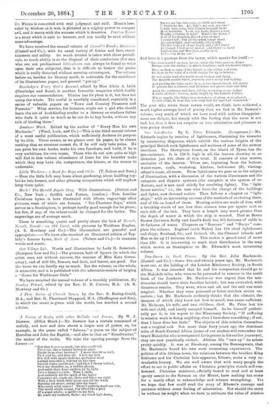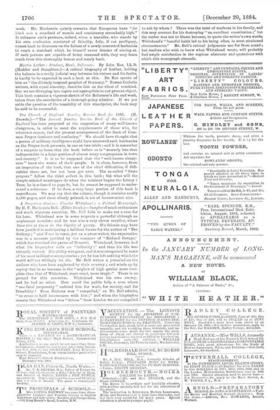Day-Dawn in Dark Places. By the Rev. John Mackenzie. (Cassell
and Co.)—Some five-and-twenty years ago, Mr. Mackenzie- went out, at the bidding of the London Missionary Society, to South, Africa. It was intended that he and his companions should go to the Makololo tribe, who were to be persuaded to remove to the north bank of the Zambese. Mr. Mackenzie was urgent that the mis- siontuies should leave their families behind ; but was overruled, with disastrous results. They went, wives and all, and the end was most tragical. Whether they were poisoned or fever-stricken seems un- certain; but Mr. Mackenzie evidently thinks that the climate, the dangers of which they knew not how to avoid, was cause sufficient. Mr. Helmore, his wife, and two children, died. Mr. Price lost his wife and child, and barely escaped himself. As be himself patheti- cally put. it, in his report to the Missionary Society, "If suffering in mission work is doing anything, then I have done something ; if not,. then I have done but little." The objects of this mission themselves. met a tragical end. Not more than forty years ago the dominant tribe of South-Central Africa (some of our readers will remember the brave Makololos who accompanied Livingstone in hie earlier journeys), they are now practically extinct. African life "eats up" its actors. pretty quickly. It was at Shoshony, among the Bamangwato, that Mr. Mackenzie found his own most interesting experiences. The politics of this African town, the relations between the heathen King Sekhome and his Christian heir-apparent, lame, make a very re- markable history. We are well aware that with many people the effort to act in public affairs on Christian principles stands self-con- demned. Christian ministers, officially bound to read and at least openly assent to the Sermon on the Mount, have nothing but scorn for a manly effort to acknowledge and retrace wrongdoing. Yet we hope that few could read the story of Khame's courage and patience without some feeling of admiration. Nor should the story be without its weight when we have to estimate the value of mission
-work. Mr. Mackenzie quietly remarks that Europeans have "for 'black men a standard of morals and consistency remarkably high." It exhausts one's patience, indeed, when a traveller, who stands by lab own confession convicted of frivolity, folly, if not profligacy, comes back to discourse on the failure of a newly-converted barbarian -to reach a standard which he himself never dreams of aiming at. If such persons are capable of being reasoned with, they may learn much from this thoroughly honest and manly book.







































 Previous page
Previous page